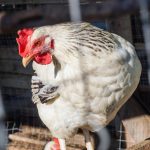Maggots are the larval stage of flies and play a crucial role in decomposing organic matter. Their life cycle consists of four stages: egg, larva, pupa, and adult. Female flies lay eggs on decaying organic material such as food scraps, manure, or dead animals.
These eggs hatch into larvae, commonly known as maggots. The larvae feed on organic matter and grow rapidly, molting several times before entering the pupal stage. During pupation, maggots transform into adult flies, which then emerge to lay eggs and continue the cycle.
Understanding the maggot life cycle is essential for effective management and prevention of infestations in poultry coops. By targeting each stage of the life cycle, it is possible to disrupt infestations. Control measures include proper sanitation practices, utilizing natural predators, regular coop inspection and cleaning, using pest-repellent products, and proper organic waste disposal.
Implementing these targeted control measures based on the maggot life cycle can help poultry owners effectively manage and prevent infestations in their coops.
Table of Contents
- 1 Implementing Proper Sanitation Practices
- 2 Utilizing Natural Predators
- 3 Regularly Inspecting and Cleaning the Coop
- 4 Using Pest-Repellent Products
- 5 Properly Disposing of Organic Waste
- 6 Seeking Veterinary Advice if Infestation Occurs
- 7 FAQs
- 7.1 What are maggots and why are they a problem for chickens?
- 7.2 How can I prevent maggots from infesting my chickens?
- 7.3 What are some natural methods to keep maggots off chickens?
- 7.4 Are there any commercial products available to prevent maggots on chickens?
- 7.5 What should I do if my chickens have maggots?
Key Takeaways
- Maggots go through a life cycle of egg, larva, pupa, and adult, and understanding this cycle is crucial for effective control.
- Proper sanitation practices, such as keeping the coop clean and dry, are essential for preventing maggot infestations.
- Introducing natural predators like parasitic wasps can help control maggot populations in the coop.
- Regularly inspecting and cleaning the coop can help identify and eliminate potential maggot breeding sites.
- Using pest-repellent products, such as diatomaceous earth, can help deter maggots and other pests from infesting the coop.
- Properly disposing of organic waste, such as manure and leftover feed, can help prevent maggot infestations.
- Seeking veterinary advice is important if a maggot infestation occurs, as it may require medical treatment for affected animals.
Implementing Proper Sanitation Practices
Remove and Dispose of Organic Matter
One of the most effective ways to prevent infestations is to remove and properly dispose of organic matter that can attract flies and provide a breeding ground for maggots. This includes regularly cleaning and removing soiled bedding, manure, spilled feed, and any other decaying organic material from the coop.
Keep Feed and Water Sources Clean
Additionally, it is essential to keep feed and water sources clean and free from contamination, as these can also attract flies and contribute to infestations. Regular cleaning and maintenance of these areas can help reduce the risk of infestations.
Proper Storage and Disposal of Organic Waste
Proper storage and disposal of organic waste are critical in preventing fly infestations. Organic waste should be stored in sealed containers or compost bins to prevent flies from accessing it and laying eggs. Proper disposal of organic waste, such as composting or disposing of it in a designated area away from the coop, can help reduce the risk of maggot infestations.
Utilizing Natural Predators

Utilizing natural predators is an effective and environmentally friendly way to control maggot infestations in poultry coops. There are several natural predators that can help control fly populations and reduce the risk of infestations. One common natural predator is the parasitic wasp, which lays its eggs inside fly pupae.
When the wasp larvae hatch, they consume the fly pupae from the inside, effectively reducing fly populations. Another natural predator is the predatory mite, which feeds on fly eggs and small larvae, helping to control fly populations before they develop into maggots. In addition to parasitic wasps and predatory mites, chickens can also be effective natural predators of flies and maggots.
Chickens are known to actively hunt and consume flies and maggots, helping to reduce fly populations in the coop. Allowing chickens access to areas where flies are likely to breed, such as manure piles or compost bins, can help control fly populations and reduce the risk of infestations. By utilizing natural predators, poultry owners can effectively control fly populations and reduce the risk of maggot infestations in their coops in a sustainable and environmentally friendly manner.
Regularly Inspecting and Cleaning the Coop
Regularly inspecting and cleaning the coop is essential for preventing maggot infestations in poultry coops. By conducting regular inspections, poultry owners can identify potential breeding grounds for flies and take proactive measures to prevent infestations. This includes checking for any decaying organic matter, such as soiled bedding, spilled feed, or manure, and promptly removing it from the coop.
Additionally, it is important to inspect areas where flies are likely to breed, such as manure piles, compost bins, or areas with standing water, and take steps to eliminate these breeding grounds. In addition to regular inspections, thorough cleaning of the coop is essential for preventing maggot infestations. This includes removing soiled bedding, scrubbing surfaces to remove any organic matter or debris, and disinfecting the coop to eliminate any potential breeding grounds for flies.
By regularly inspecting and cleaning the coop, poultry owners can create an environment that is less attractive to flies and reduce the risk of maggot infestations in their coops.
Using Pest-Repellent Products
Using pest-repellent products can be an effective way to prevent maggot infestations in poultry coops. There are several types of pest-repellent products available that can help deter flies and reduce the risk of infestations. One common type of pest-repellent product is fly traps, which use bait to attract flies and then trap them, preventing them from laying eggs and contributing to infestations.
Fly traps can be placed in strategic locations around the coop to capture flies before they have a chance to breed. In addition to fly traps, there are also insecticide sprays and dusts that can be used to control fly populations and prevent infestations. These products can be applied to surfaces where flies are likely to land or breed, such as walls, ceilings, or manure piles, to help control fly populations and reduce the risk of infestations.
It is important to carefully follow the instructions for any pest-repellent products used in the coop to ensure their effectiveness and minimize any potential risks to poultry or humans. By using pest-repellent products strategically, poultry owners can effectively control fly populations and reduce the risk of maggot infestations in their coops.
Properly Disposing of Organic Waste

Preventing Fly Breeding
To prevent infestations, it is essential to properly store and dispose of organic waste in a way that prevents flies from accessing it and laying eggs. This includes storing organic waste in sealed containers or compost bins to prevent flies from breeding in it.
Disposal and Composting
In addition to proper storage, organic waste should be disposed of in a designated area away from the coop to further reduce the risk of infestations. Composting organic waste can also be an effective way to manage it while reducing the risk of fly infestations. Properly managed compost piles can generate heat that kills fly eggs and larvae, reducing the risk of infestations while producing valuable compost for use in gardens or landscaping.
Creating a Fly-Resistant Environment
By properly disposing of organic waste, poultry owners can create an environment that is less attractive to flies and reduce the risk of maggot infestations in their coops.
Seeking Veterinary Advice if Infestation Occurs
If a maggot infestation occurs in a poultry coop, it is important to seek veterinary advice to effectively manage the infestation and prevent future occurrences. A veterinarian can provide guidance on appropriate treatment options for controlling maggots and preventing harm to the affected poultry. In severe cases of maggot infestation, veterinary intervention may be necessary to ensure the health and well-being of the affected birds.
In addition to seeking veterinary advice for treatment options, it is important to work with a veterinarian to identify potential underlying causes of the infestation and develop a plan for preventing future occurrences. This may include evaluating sanitation practices, implementing pest-control measures, and making any necessary changes to coop management practices to reduce the risk of future infestations. By seeking veterinary advice if a maggot infestation occurs, poultry owners can effectively manage the infestation and take proactive measures to prevent future occurrences in their coops.
In conclusion, understanding the life cycle of maggots is essential for effectively managing and preventing infestations in poultry coops. By implementing proper sanitation practices, utilizing natural predators, regularly inspecting and cleaning the coop, using pest-repellent products, properly disposing of organic waste, and seeking veterinary advice if an infestation occurs, poultry owners can create an environment that is less attractive to flies and reduce the risk of maggot infestations in their coops. By taking proactive measures to prevent infestations and effectively managing any occurrences that do arise, poultry owners can ensure the health and well-being of their birds while maintaining a clean and sanitary environment in their coops.
If you’re looking for more information on keeping chickens, you might be interested in this article on how to build a garden chicken coop. It’s important to provide a safe and comfortable environment for your chickens to prevent issues like maggots.
FAQs
What are maggots and why are they a problem for chickens?
Maggots are the larval stage of flies and can be a problem for chickens because they can infest open wounds, causing irritation and potential infection. Additionally, maggots can also infest chicken feed and living areas, posing a health risk to the birds.
How can I prevent maggots from infesting my chickens?
To prevent maggots from infesting chickens, it is important to keep the coop and surrounding areas clean and free of any decaying organic matter. Regularly remove any spilled feed, manure, and other waste to eliminate potential breeding grounds for flies.
What are some natural methods to keep maggots off chickens?
Natural methods to keep maggots off chickens include using diatomaceous earth, which can be sprinkled in the coop and nesting boxes to deter flies and their larvae. Additionally, keeping the coop well-ventilated and using herbs such as lavender and mint can also help repel flies.
Are there any commercial products available to prevent maggots on chickens?
Yes, there are commercial products such as fly repellent sprays and powders specifically designed to keep maggots off chickens. These products can be applied directly to the birds and their living areas to deter flies and prevent infestations.
What should I do if my chickens have maggots?
If you notice maggots on your chickens, it is important to take immediate action. Remove the maggots and clean the affected area with an antiseptic solution to prevent infection. Additionally, consult a veterinarian for further treatment and advice on preventing future infestations.
Meet Walter, the feathered-friend fanatic of Florida! Nestled in the sunshine state, Walter struts through life with his feathered companions, clucking his way to happiness. With a coop that’s fancier than a five-star hotel, he’s the Don Juan of the chicken world. When he’s not teaching his hens to do the cha-cha, you’ll find him in a heated debate with his prized rooster, Sir Clucks-a-Lot. Walter’s poultry passion is no yolk; he’s the sunny-side-up guy you never knew you needed in your flock of friends!







